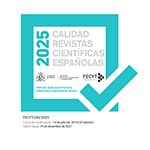La cultura lingüística y el componente cultural en la enseñanza de lenguas no maternas: observaciones sobre algunos paradigmas de la competencia cultural
Resumen
El artículo consiste en la discusión de algunos de los supuestos del macro-paradigma de la competencia cultural, ligados a la necesidad de integrar la lengua y la cultura en la enseñanza de lenguas no maternas (LNMs), y en el esbozo de una propuesta de orientación ecológica. El cotejo del paradigma de la competencia sociocultural y el de la competencia intercultural que se pueden enmarcar en él, resalta las limitaciones de ambos, asociadas esencialmente en el caso del primero con una concepción esencialista e idealizada tanto de la lengua como de la cultura, concebida como un todo homogéneo y, en el caso del segundo, con el punto de vista contrario, que otorga una importancia excesiva a la heterogeneidad lingüística y cultural. Una de las consecuencias más notables en ambos casos es la exclusión de parte de la realidad observada. Nuestra propuesta se basa en la idea según la cual la heterogeneidad inherente a las lenguas y las culturas no excluye que se las pueda interpretar en términos esencialistas, de acuerdo con la cultura (lingüística) de cada contexto. Interpretamos la adquisición y el aprendizaje de lenguas como un proceso de socialización que tiene lugar en el marco de una red en la que el aprendiz es un interlocutor más, si bien sus circunstancias hacen necesario un grado mayor de colaboración por parte de los otros miembros de la red. Esta concepción del aprendizaje, centrada en el individuo y en las interacciones comunicativas en que participa, permite enmarcar el proceso de aprendizaje de lenguas en una perspectiva más amplia que entronca con las preocupaciones y los intereses característicos de la ecología lingüística. Concluimos recalcando la relevancia que entrañan tanto la cultura (lingüística) de los aprendices como las aportaciones de la ecología lingüística para la reflexión teórica y metodológica en torno al papel de la cultura en el aprendizaje de LNMs.Descargas
Descarga artículo
Licencia
La revista Didáctica. Lengua y Literatura, para fomentar el intercambio global del conocimiento, facilita el acceso sin restricciones a sus contenidos desde el momento de su publicación en la presente edición electrónica, y por eso es una revista de acceso abierto. Los originales publicados en esta revista son propiedad de la Universidad Complutense de Madrid y es obligatorio citar su procedencia en cualquier reproducción total o parcial. Todos los contenidos se distribuyen bajo una licencia de uso y distribución Creative Commons Reconocimiento 4.0 (CC BY 4.0). Esta circunstancia ha de hacerse constar expresamente de esta forma cuando sea necesario. Puede consultar la versión informativa y el texto legal de la licencia.










